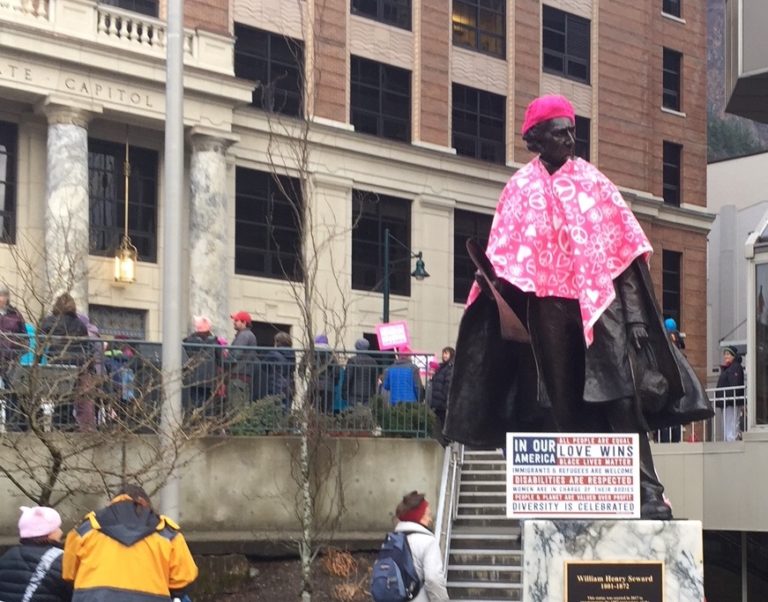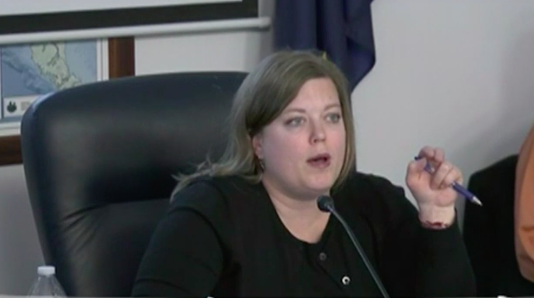In a tortured, nearly hour-long speech that focused on his well-worn quest for income taxes, Alaska Gov. Bill Walker went from breathless to scolding, to theatrically angry, and then back to breathless.
It was the annual State of the State address, a minefield of challenges for even the most eloquent orator. And an almost impossible task for someone facing a legislative body divided between small-government conservatives and Bernie Sanders Democrats.
Walker used his pulpit to reminisce about his impoverished upbringing, to liken his hoped-for gasline to the building of the Trans Alaska Pipeline System. And he badgered Senate Republicans, provoked challengers to define their budget cuts, and set the stage for his re-election campaign.
Somewhere in it all, he gave a nod to fisheries, agriculture, timber, and tourism.
The Democrats in the Legislature applauded him warmly. Those watching on television while engaged in drinking games sipped as he ticked off each standard speech category and reminded everyone that he had solved the sexual assault problem with the National Guard.
In Walker’s fourth and possibly final address to the Legislature, he provided no new ideas or initiatives but did provide fresh packaging for what has become the theme of his governorship: Taxes.
Walker’s income tax has morphed from “new revenue” in recent years to what he now calls “broad-based participation.”
Senate Majority Leader Pete Kelly sat stoically behind him, his eyes revealing little love for the governor’s taxing plan. Kelly has held together a Senate majority and kept them from capitulating, just as Sen. Kevin Meyer had done before him.
WALKER’S CAMPAIGN PROMISE IN THE REAR VIEW MIRROR
In 2014, candidate Walker promised voters he would never institute an income tax, but he started his term in office by pushing for taxes as soon as he was elected. It has taken the will of the Alaska Senate majority to help him keep his promise of “no taxes.”
In his three years as governor, Walker has proposed a dozen different taxes — fish taxes, oil taxes, tourist taxes, mining taxes, fuels taxes, sales taxes, four or more different styles of income taxes. Now, to avoid the Legislature’s process, he is proposing it through regulation: A tax on airplanes and Uber riders who use the State’s airports.
Tonight, the governor singled out the Senate to tell them they were being partisan by not going along with his income tax plan. He outlined his latest income tax: It’s temporary.
“I’m proposing a temporary tax,” Walker said. It would pay for deferred maintenance only, he said.
NO LONGER ‘GRAVE FISCALS’
Walker ignored the theme of his speech given just one year ago, when he said Alaska was in the “gravest fiscal crisis in state history.”
Last year, he said revenues were down more than 80 percent from four years prior, and he said he had already cut the budget 44 percent, he said. He had to have new revenue.
Most of that budget cut was, however, capital budget spend, payment of oil tax credits (which are still due and were simply deferred), and the $700 million that he took from Alaskans’ Permanent Fund dividends.
Last year, his officials said that oil production would decline by 12 percent in the coming year. This year, at 530,000 barrels a day, oil production is increasing. Walker was off by 18 percent on volume. Some observers felt that he was deliberately manipulating the oil production forecast in order to strengthen the case for his tax proposals.
Alaska North Slope crude is selling at nearly $70 a barrel, some 27 percent higher than a year ago.
And the Alaska Permanent Fund earned $300 million on Tuesday alone. Alaska’s biggest savings account now has $65.58 billion in it., up two billion in less than a month.
Three of the announced candidates for governor offered critiques of the governor’s fourth tax message:
MIKE DUNLEAVY STATEMENT:
“I appreciate very much the time that Governor Walker took to address Alaskans in the 2018 State of the State. No need to respond to all points, as you and I have heard the same statements year after year from the Walker administration, and with the exception of increasing unemployment, a loss in Alaskan population, and a rise in crime, nothing has changed.
“I do agree with Governor Walker on a few items. I support his plan to ‘pink slip ourselves before we pink slip our fellow Alaskans.
“I, along with my Alaskan neighbors, believe the first pink slip should go to Governor Walker, who declared tonight, after highlighting $14 billion dollars wasted under his watch, that ‘we the state can’t get our act together.’ I agree. As the executive head of state, the Governor is singularly responsible for those failures.
“I agree with one final point, it is time to put Alaskans back to work. This Governor has had three years and in that time steered our great state into historical highs for unemployment. In his own words, “one of the best cures for social ills is a job”. Given that, it makes sense that the social ills facing our state have increased alongside unemployment. Alaska’s public safety crisis, the national and historic highs of unemployed Alaskans, waste of billions of dollars, and relentless pursuit of “broad based direct participation by individuals” aka taxes, are a reflection of the Walker administration.”
MIKE CHENAULT STATEMENT:
“It was long on family and short on substance. Walker’s tax is a temporary three-year tax that raises about $250 million. He can’t get an income tax to pay for government so instead he wants to take that money and catch up on deferred maintenance. It’s just a ploy to get any income tax on the books.
“He thinks that will get more buy-in from Alaskans. But every $10 increase in the rice of oil gets us that $250 million that he would get in taxes. We’re now at $300 million more this year due to that rising price.”
SCOTT HAWKINS STATEMENT
“There was no vision offered by the governor. No sense of optimism. No belief in Alaska’s private sector. No emphasis on the good news of the past year, such as the Permanent Fund’s value surging, oil production growing for the first time in nearly a generation, and recently discovered oilfields looking increasingly promising.
“All we got tonight was more of the same – tax the private sector and spare the public sector. Typical left-wing governance.
“All this governor ever does is propose new taxes and describe them in a different way. The absolute worst thing we can do right now is burden the private sector with new taxes. Doing that would significantly deepen and extend our economic downturn. I am not sure what planet this guy is on.”
MICHAEL SHELDON STATEMENT
“Governor Walkers State of the State address tonight, saying Alaskans will be first to be hired for the LNG gas line project, just a bunch of lies! 75/25 ownership split for China and their own hired workers will build it according to the memorandum of understanding. Deception at its best from the Walker administration. Without Alaskan hire and a better-negotiated contract in Alaska and stable gas markets, sounds to be a bad plan at this time.”









 Mortal Lessons: Notes On The Art Of Surgery, by Richard Selzer, Yale University surgeon. An excerpt from one of his collection of essays:
Mortal Lessons: Notes On The Art Of Surgery, by Richard Selzer, Yale University surgeon. An excerpt from one of his collection of essays:


